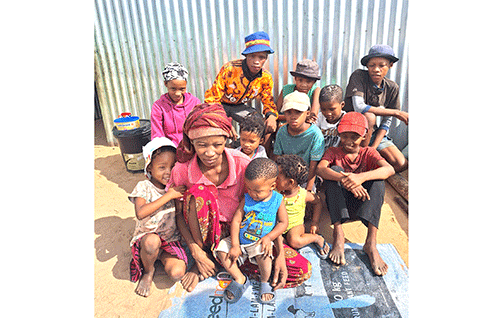This year’s Independence Day commemoration theme ‘Beyond 35: For a Prosperous Future’ has little resonance with the life of 36-year-old Lena Katukuri.
Katukuri, a squatter in Canaan informal settlement at Gobabis, said unlike others, she has not been fortunate enough to reap prosperous fruits in an independent Namibia.
She said growing up with her parents, who made little from being farm employees, she has known poverty all her life.
She does not recall when exactly she dropped out of school, but it was many years ago. In hindsight, it is a decision she regrets to this day.
At 36, Katukuri has 11 children, some of whom are said to be over 20 years old and the youngest being about two years old. None of them are in school.
She said her children are just at home because she cannot afford to buy school necessities such as uniforms, toiletries, pay for hostel accommodation and other educational needs.
Regional education inspector in Omaheke Ismael Kazondanga refuted excuses given by some parents about not being able to afford uniforms or stationery.
“Uniforms are not compulsory. Therefore, no school should turn a learner back because they have no uniform”, he stated.
The parental decision to keep children from going to school under any circumstances defeats the purpose of the universal primary education policy, he added.
The policy, which was implemented in 2012, aims to eliminate disparities in primary education access and provide free and compulsory primary education to all children within the country, regardless of their socio-economic backgrounds.
Kazondanga affirmed that the “ministry of education provides money to schools for stationery”.
He urged parents to refrain from the tendency of registering learners at the beginning of the year only to ensure the continuation of government grants through the ministry of gender equality, poverty eradication and social welfare”. The division of the marginalised communities in the gender equality ministry in Omaheke is aware of Katukuri’s situation.
They are doing all within their power to avail government services, but the challenges are diverse, and some are beyond them. Regional development planner in the gender equality ministry Desiree Masheshe earlier this year said her office took three of Katukuri’s children to a boarding school in Donkerbos.
They later learnt that the children quit school and returned to Gobabis within weeks of the school calendar.
“It is unfortunate that the children decided to come back. They now add to the number of people needing food in that household”, Masheshe said.
She reported that although some of the children are currently recipients of government grants, the money is not enough to cater for the needs of the entire family.
Hence, her office assists them with food whenever they get food parcels in excess.
The children said they left school because they were not getting enough food in the hostel.
They said they could not cope.
Kazondanga stated that the Donkerbos primary school has a community hostel, which is subsidised by the ministry to buy food items, pay the community hostel workers and for utilities.
He said the fact that the hostel buys their own food without a middleman is to their advantage, as they acquire enough nutritious food, compared to public hostels.
Challenges such as hunger, lack of uniforms and others are possible elements which could destablise the progress of policies established to fast-track and contribute to the effective realisation of Namibia’s Vision 2030.
This vision is crucial for the successful development and implementation of inclusive education. Another challenge is that Katukuri and her partner have no home of their own.
They, together with their 11 children, live in a one-room shack, which they were left to take care of while the owners are away.
She said whenever the owners of the shack come to town, her family is left with no option but to give space and sleep outside for the period that the owners are around, under any weather condition.
She is thus asking good Samaritans to help her with building material so that she can erect a proper structure for her family.
*Julia Kamarenga is an information officer at MICT Omaheke.



